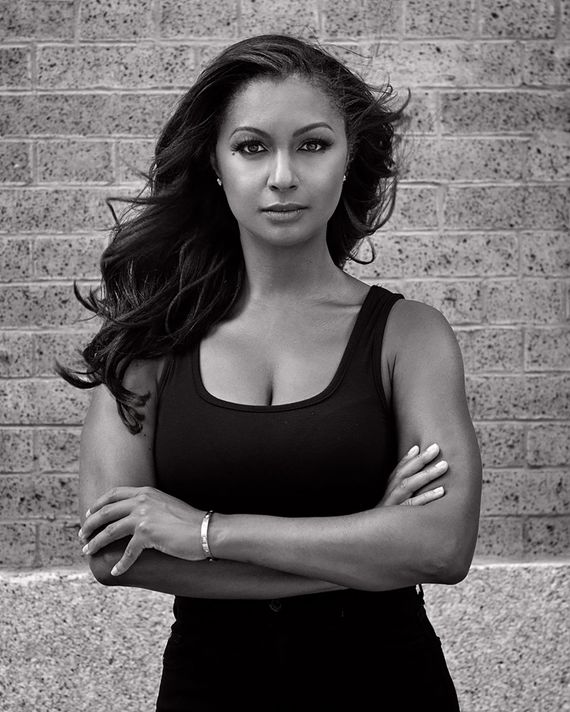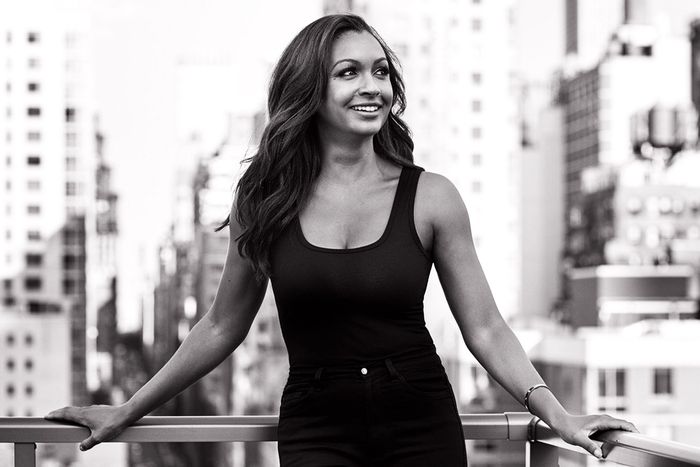
In the premiere of The Real Housewives of New York City’s 13th season, cast member Leah McSweeney waits patiently in Central Park as a petite Black woman strides into view sporting a mask adorned with the phrase “Black Lives Matter” and a hooded sweatshirt emblazoned with the names Yusef, Kevin, Antron, Korey, and Raymond, also known as the Exonerated Five, who were convicted and later vacated of the aggravated assault and rape of a young white woman in Central Park. McSweeney would later go on to introduce the woman from the scene to Sonja Morgan as “Black-girl magic personified” and proceed to request her presence at the infamously anachronistic Morgan townhouse for brunch. Eboni K. Williams has made her grand entrance into the Real Housewives franchise, and true to the messaging in her debut book, Pretty Powerful, she is using all of the available tools at her disposal to make her mark.
“Everything I seek is owed to me,” Williams states unabashedly. “I also make it my first business to be worthy of everything — to show up in a capacity of unadulterated, unimpeachable excellence.” That conviction has brought her to a place where she feels she can set her own terms, introducing the New York Housewives to someone else’s experiences for the first time, as opposed to merely having them endure a culture shock.
Being the first to accomplish something is not an unfamiliar feeling for Williams: Her life and career have been punctuated by firsts, from being the first Black woman at her law firm to the first to host an early prime-time show on Fox News. “We all start connections, start conversations, and start developing ideas about one another before we utter a word,” Williams points out, doubling down on the ethos of Pretty Powerful, which emphasizes that the choice between substance and appearance is a false one. “I had a lot of intentionality around what I was trying to convey to this new group of friends and women, from the Central Park scene where I wear the Exonerated Five on my chest to the bold pink blazer-dress in Sonja Morgan’s townhouse, where I’m conveying femininity but also strength.” Her sartorial references are all crafted with an objective in mind, down to her donning a Howard sweatshirt in the distinctive pink-and-green color scheme associated with her sorority, Alpha Kappa Alpha, a nod to the historically Black organization’s founding chapter as well as a subtle acknowledgment of Vice-President Kamala Harris, all reinforcing the central theme in her book: “an awareness and leveraging of how we package and present our femininity as an aesthetic that is uniquely authentic and impactful.”
Williams’s debut as the first Black cast member in RHONY’s 13 seasons comes on the heels of actress Garcelle Beauvais’s entry into the sister series The Real Housewives of Beverly Hills, and there has been speculation that their casting was a response to the racial reckoning that had begun to make its way through the Bravo network in 2020, from the firing of Vanderpump Rules stars Stassi Schroeder and Kristen Doute after revelations of racist actions from former recurring cast member Faith Stowers to LeeAnne Locken’s removal from The Real Housewives of Dallas after making racist remarks to a Mexican co-star.
Williams reveals, however, that she had been in conversation with Bravo for well over a year before the formal announcement and wasn’t contacted as a direct reaction to the national uproar that emerged over the killings of George Floyd, Breonna Taylor, and Ahmaud Arbery. “It’s never too late to do the right thing,” Williams says, noting that divine timing may have brought this opportunity to her. “I just believe this was the right moment, and I think I’m really blessed to feel like I might be the exact right person for this moment and this group of women.”
A long-standing master of the pivot, Williams has functioned in the public sphere as a lawyer, pageant competitor, media correspondent, and radio personality and currently hosts two shows on Sean Combs’s Revolt network, State of the Culture and Revolt Black News, the latter of which she also serves as executive producer. Considering the accomplishments she has collected in her career at just 37 years old, RHONY may not seem like an intuitive evolution of her work, but Housewives across the franchise have used the series as a vehicle to expand the reach of their own brand, from Kandi Burruss on The Real Housewives of Atlanta to Bethenny Frankel, the original Cinderella story of RHONY.
In Williams’s case, her experiences as a correspondent for Fox News have more than prepared her to enter the notoriously gilded world of the Upper East Side alongside a set of co-workers who are nearly all two decades her senior. “Things that I developed during my time at Fox News, and really strengthened my ability, was to sit with the humanity of people who were polar political opposites of mine, had different life experiences, different lenses on the world,” she says. “My ability to develop that shared humanity with people that were culturally and politically different from me was exactly what was needed to develop deep connections with some of my castmates as well.” Williams grew up in Charlotte, North Carolina, and completed her legal training in Louisiana before eventually moving to Los Angeles and to New York, which has made her adept at bridging cultural, racial, and geographic gaps.
Williams’s talents did not inoculate her from the hurdles of reality-TV spaces, however; though she is a private person, she was required to adjust to the demands of opening up about everything from bowel movements to romance to finances as well as a broken engagement during the pandemic and an acknowledgment of prior credit issues, which she has since rebounded from several times over. Williams admits she found it challenging. “It’s the opposite of how I’ve conducted my life for the last 37 years,” she says, “but I just realized, at this point, I’m preoccupied with connecting with people, and connecting to women, in particular, around those issues of love, financial stability, and community — and I’m not going to get the impact and the opportunity for connection if I don’t share and if I don’t become extremely transparent and vulnerable in those areas.”
Though that was a challenge, Williams took pains to ensure that her full self was presented, expressing that she wasn’t interested in adapting as much as coexisting with people who have had different experiences from her own. She has heeded advice from other Black women in the Bravo ecosystem, such as her AKA sister and The Real Housewives of Potomac cast member Gizelle Bryant and Married to Medicine’s Dr. Simone Whitmore, who reminded Williams that they have no control over how scenes may be edited and received. Ultimately, Williams references a James Baldwin quote from the legendary Baldwin-Buckley debates: “You have to decide who you are and force the world to deal with you, not with its idea of you.” For Williams, that means presenting the concept of Black excellence in a reality-TV world that often doesn’t offer such a portrayal to the masses.
“I’m very clear on who I am as a woman, as a Black woman, who is deeply, deeply, deeply committed to Black excellence,” Williams emphasizes — an outlook she shares with The Real Housewives of Potomac newcomer Wendy Osefo, to mixed results. “Whether it’s perceived as whatever — braggadocious, obnoxious, redundant — I do not concern myself with those perceptions for a second.”
For Williams, standing true to this purpose is a way to honor the legacy of her ancestors and the Black experience — and while she has made it clear that she isn’t on the show to serve as a teacher for white women, Williams ensures that her own vantage point is firmly established throughout the season, from incorporating references to the Black communities in Sag Harbor in discussions about the Hamptons (a frequent location for the New York cast to come together in various states of drunken stupor) to bringing a group of women who rarely ever go north of 96th Street into the historically Black neighborhood of Harlem.
Williams is proud of her bevy of accomplishments — becoming a lawyer at age 23, broadcasting on different networks, and hosting the podcast Holding Court with Dustin Ross — but continues to be humbled by her impact. “My goal with being on Housewives is to just broaden my reach,” the self-described “Bravoholic” explains, saying that she wants to use the cultural juggernaut of RHONY as a way to connect with women across demographics. “People watch Housewives from literally 12 years old to 80-something, and I think that’s the beauty of this franchise.”
In anticipation of the season premiere, Williams has been front and center in a heavy press run, including a “Page Six” profile that landed her on the cover of the New York Post Sunday edition and appearances on The Wendy Williams Show, Good Morning America, and The Real. But she continues to cultivate the new terrain on her own terms, as she has for the bulk of her career trajectory. She sets the stakes clearly in her RHONY tagline: “I’ve had to work twice as hard for half as much, but now I’m coming for everything.”
Time will tell how her co-stars, known for their larger-than-life personalities, receive her overtures, but one thing is for certain: The woman who came to disrupt the status quo on one of the largest cable-news networks in the country is more than ready to step up to the challenge, change the narrative, and show up for Black women. And Black RHONY fans are eager to support her arrival. True to the words of her fellow soror Vice-President Harris, if she is the first, she better damn well not be the last — and as McSweeney remarked on her first Instagram post highlighting them as a duo, let the games begin.


